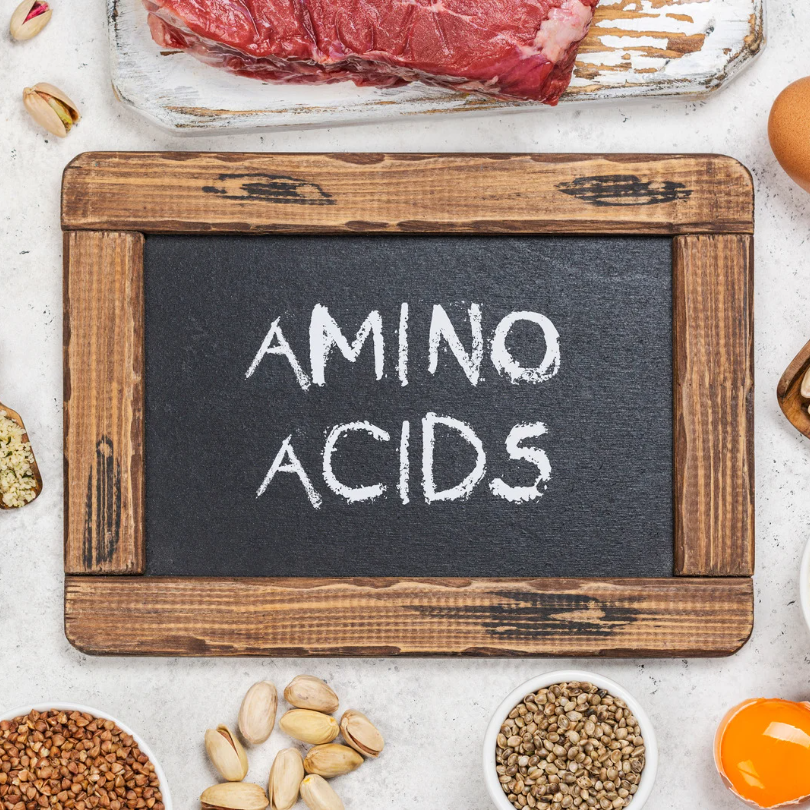Understanding Amino Acids: The Building Blocks of Protein

Introduction
Amino acids are the building blocks of proteins, which are essential macromolecules for the human body. Amino acids are also important for the production of enzymes, hormones, and neurotransmitters. There are 20 different amino acid that the human body needs to function properly, and they can be classified into three categories: essential amino acid, non-essential amino acid, and conditional amino acid. In this article, we’ll explore the different types of amino acid, their benefits, food sources, deficiencies, and important for overall health and wellness.
Types of Amino Acids
Essential Amino Acids: Essential amino acids are those that the body cannot produce on its own and must be obtained through the diet. There are nine essential amino acid, including histidine, isoleucine, leucine, lysine, methionine, phenylalanine, threonine, tryptophan, and valine. This amino acid is crucial for protein synthesis, which is necessary for muscle growth and repair, immune system function, and hormone production. Some sources of essential amino acids include animal products like meat, fish, and eggs, as well as plant-based sources like quinoa, chia seeds, and hemp seeds.
Non-Essential Amino Acids: Non-essential amino acid are those that the body can produce on its own, and they are not required to be obtained through the diet. There are eleven non-essential amino acids, including alanine, arginine, asparagine, aspartic acid, cysteine, glutamic acid, glutamine, glycine, proline, serine, and tyrosine. Although they are not essential for survival, they are still important for maintaining overall health and wellness.
Conditional Amino Acids: Conditional amino acids are those that are not normally essential but become essential under certain conditions, such as during illness or stress. These include arginine, cysteine, glutamine, tyrosine, glycine, ornithine, proline, and serine. During times of stress or illness, the body may not be able to produce enough of this amino acid on its own, and supplementation or increased intake through the diet may be necessary.
Benefits of Amino Acids
Muscle Growth and Repair: Amino acids are essential for muscle growth and repair, as they are the building blocks of protein. Essential amino acid, in particular, play a crucial role in muscle protein synthesis. Studies have shown that consuming essential amino acid, either through food or supplements, can improve muscle growth and recovery after exercise (1). The non-essential amino acid also play a role in muscle repair, as they are needed for the production of collagen, which is an important component of connective tissue.
Immune System Function
- Amino acids are important for immune system function, as they are necessary for the production of antibodies, which are proteins that help the body fight off infections. Glutamine, in particular, is an important amino acid for immune function, as it is needed for the production of white blood cells
- Research has also shown that supplementation with glutamine can improve immune function in athletes
- Mood and Cognitive Function: Amino acids are important for mood and cognitive function, as they are necessary for the production of neurotransmitters, which are chemical messengers that transmit signals in the brain. Tryptophan, for example, is the precursor to serotonin, which is a neurotransmitter that plays a role in mood regulation.
- Tyrosine is the precursor to dopamine, which is a neurotransmitter that plays a role in motivation and reward. Studies have shown that supplementation with tryptophan can improve mood and cognitive function in individuals with depression
- While supplementation with tyrosine can improve cognitive performance under stressful conditions
- Overall Health and Wellness: Amino acids are important for overall health and wellness, as they play a role in many physiological processes in the body. For example, glycine is involved in the production of collagen, which is important for skin health and wound healing.
- Arginine is important for the production of nitric oxide, which helps to regulate blood pressure and improve circulation. Methionine is important for the production of glutathione, which is a powerful antioxidant that helps to protect the body against oxidative stress.
Food Sources of Amino Acids
Animal Sources: Animal products are generally considered to be the best sources of amino acid, as they contain all of the essential amino acid in the correct proportions. Some examples of animal products that are high in amino acid include:
- Meat: beef, chicken, pork, lamb, etc.
- Fish: salmon, tuna, cod, etc.
- Eggs: both the yolk and the white contain amino acid
Plant Sources: Plant-based sources of amino acid can be more challenging to obtain, as most plant-based foods do not contain all of the essential amino acid in the correct proportions. However, by combining different plant-based foods, it is possible to obtain all of the essential amino acids. Some examples of plant-based sources of amino acids include:
- Quinoa: a complete protein that contains all of the essential amino acids
- Chia seeds and hemp seeds: good sources of essential amino acids, particularly lysine, and arginine
- Legumes: beans, lentils, chickpeas, etc. are good sources of protein and amino acids
How to Choose the Right BCAA Supplement-2023
Supplements
Amino acid supplements are also available and can be a convenient way to ensure that you are getting enough of a particular amino acid. However, it is important to be cautious when taking supplements, as high doses can be harmful. It is also important to consult with a healthcare professional before starting any new supplements.
Amino Acid Deficiencies
Amino acid deficiencies can occur if the body is not getting enough of a particular amino acid. This can happen if the diet is not balanced, or if the body is not able to produce enough of the amino acid on its own. Symptoms of amino acid deficiencies can vary depending on the amino acid in question but can include:
- Weakness and fatigue
- Muscle wasting
- Skin rashes or lesions
- Poor wound healing
- Mood disorders
- Digestive issues
It is important to meet daily amino acid requirements through a balanced diet or supplementation, to prevent deficiencies.
Importance for Overall Health and Wellness
Amino acids are essential for overall health and wellness, as they play a role in many physiological processes in the body. By ensuring that you are getting enough amino acids through your diet, you can improve muscle growth and repair, immune system function, mood and cognitive function, and overall health and wellness. It is important to consume a balanced diet that includes a variety of protein sources, including animal and plant-based sources.
Frequently asked questions
Conclusion
Amino acids are the building blocks of protein and are essential for many physiological processes in the body. There are 20 different amino acids that the body needs to function properly, including essential, non-essential, and conditional amino acids. By consuming a balanced diet that includes a variety of protein sources, you can ensure that you are getting enough amino acids to support muscle growth and repair, immune system function, mood and cognitive function, and overall health and wellness. If you are concerned about your amino acid intake, consult with a healthcare professional or a registered
- Where to Find the Best Plum Cake in Bangalore for Christmas & New Year - November 23, 2025
- Water Intake Calculator: Everything You Need to Know - September 7, 2024
- 5 Weight Gain Drink Recipes for Healthy Bulking - March 29, 2024










One thought on “Amino Acids and Overall Health: What You Need to Know”